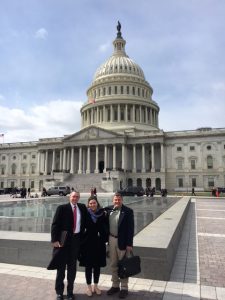Share this article
Combined efforts raise support for Recovering America’s Wildlife Act
Leaders from corporations, state wildlife agencies and NGOs traveled to Washington, D.C. earlier this month to urge their congressional delegations to support the Recovering America’s Wildlife Act (H.R. 4647).
The Association for Fish and Wildlife Agencies organized the two-day fly-in March 13-14. Caroline Murphy, government relations program coordinator at The Wildlife Society, participated in the event.

TWS members and staff participated in the D.C. fly-in. From left to right: Paul Johansen, chief, Wildlife Resources Section, WV DNR; Caroline Murphy, TWS government relations program coordinator; Scott Warner, chief assistant, Wildlife Resources Section, WV DNR.
“We had a lot of good reception from several member offices.” Murphy said, “There was a lot of excitement about this bill, its potential, and its goal of supporting science-based wildlife conservation.”
The bill would redirect $1.3 billion in existing funds from energy and mineral development on federal lands and waters towards state wildlife management efforts. The money would support species that states have identified as species of greatest conservation need to help prevent them from becoming federally threatened or endangered in the future, including 21 Democrats and 13 Republicians.
Since it was introduced by Reps. Debbie Dingell, D-Michigan, and Jeff Fortenberry, R-Nebraska, last December, its co-sponsor count has risen to 38.
The bill would enact recommendations from the Blue Ribbon Panel on Sustaining America’s Diverse Fish and Wildlife Resources, providing more funds than the current State Wildlife Grants program, which is subject to yearly appropriations and usually only funded at about $50 to $60 million each year.
The bill still needs to clear the House Natural Resources Committee before it can come before the full House. Efforts are underway to put forward a companion bill in the Senate.
To learn more about the Recovering America’s Wildlife Act, visit www.wildlife.org/recovering-americas-wildlife-act or ournatureusa.com.
Header Image: RAWA supporters believe species such as the Northern leopard frog (Lithobates pipiens) could be prevented from becoming federally endangered if states have more resources for management.








